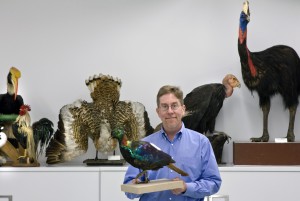“Beauty is bought by the judgment of the eye,” says William Shakespeare in Love’s Labour’s Lost. Truer words could not be said of Professor Richard Prum’s new course, “The Evolution of Beauty.” Offered by the DeVane Lectures through the Humanities Department and the Department of Ecology and Evolutionary Biology, Prum’s course offers the unique insights of an expert who has been working on this area since late 1980s.

In this course, Prum presents his groundbreaking theory and research on how scientists can look at evolutionary biology from an aesthetic rather than adaptive view. The course also explores many related topics, including scientific controversies from publication bias to feminism’s role in evolutionary biology.
This aesthetic view is not yet a widely accepted approach in evolutionary biology. “My current aesthetic view of the field has really taken shape only in the last ten years. Yet, the relationship between evolutionary biology, humanities and social sciences is unfortunately dominated by the adaptive view” said Prum.
“One of the fundamental assertions in the class is that the subjective experience, the unmeasurable quality of internal cognitive experience of animals, is an evolutionary force in nature,” he said. “Currently evolutionary biology has been structured in a way where subjective experiences are not identified.”
In addition to an exploration of this subjective experience, Prum stated that he aims to establish a kind of connection between evolutionary biology and feminism through the course, “which is very explanatory and productive for both fields.”
“Evolutionary biology has been thought to be antagonistic to socially constructed views of feminism,” he notes. Exactly how remains to be seen in the course. However, Prum does note that by defining subjective experiences as autonomous, “we end up with new insights into female autonomy”.
